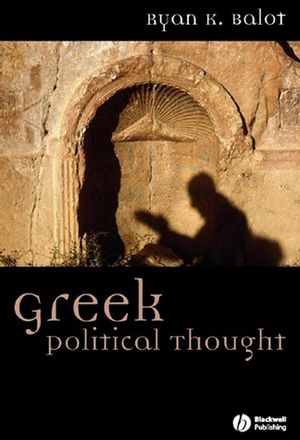|
Textbook
Greek Political ThoughtISBN: 978-1-4051-0030-4
Paperback
368 pages
November 2005, ©2006, Wiley-Blackwell
 |
||||||
Abbreviations.
1. Introduction: How to Do Greek Political Thought.
2. Archaic Greece and the Centrality of Justice.
Achilles, Agamemnon, and Fair Distribution.
Justice as “Distinctively Human”.
Institutions and Values of the Early Polis.
What is Justice? The Voice of the Oppressed and the Origins of Political Thought.
The Egalitarian Response.
The Elitist Response.
Case Study: Sparta and the Politics of “Courage”.
A Second Case Study: Archaic Athens and the Search for Justice.
3. Democratic Political Thinking at Athens.
Evidence and Sources.
Democracy Ancient and Modern.
Democratic Conceptions of Freedom.
Democratic Deliberation.
Courage, Trust, and Leadership.
Democratic Political Thought outside Athens?.
Protagorean Arguments for Democracy.
Democratic Conceptions of Equality.
Justice and the Demos.
4. Criticizing Democracy in Late Fifth-Century Athens.
Mapping out the Problem: The “Old Oligarch”.
Modern and Ancient Quandaries.
Nomos and Phusis.
The Challenge of Thrasymachus and Callicles.
Thucydidean Imperialists Revisit Nomos and Phusis.
Socrates and Nomos.
Logos and Ergon.
Democratic Epistemology and Relativism.
Democratic Epistemology and Untrustworthy Rhetoric – or, Where Does the Truth Lie?.
Socrates and Athens.
5. Imperialism.
Aristotle Analyzes Imperialism.
Definitions and History.
Monarchic Imperialism.
Natural Superiority?.
Debating Athenian Imperialism.
Final Thoughts.
6. Fourth Century Revisions.
The ancestral republican “solutions”.
The monarchic “solution”.
Plato’s “solutions”.
Criticizing Contemporary Politics.
Plato on Rhetoric and Order in the Gorgias.
The Priority of Reason in City and Soul: Plato’s Republic.
Educating Citizens in the Classical Context.
Politics and Ethics.
Philosophical Rulers.
Platonic Political Philosophy after the Republic.
7. Aristotle’s Political Thought.
Civic Conflict, Emotion, and Injustice: Observing the Polis as It Is.
Exploring What Ought To Be: Aristotle’s Naturalism.
Aristotle on the Good Life.
Nature in the Politics.
Aristotle on Slavery.
Polis and Citizenship in General.
Aristotle’s Best Polis.
Political Possibilities in Existing Cities.
The Best Constitution in Relation to Existing Conditions.
Classification of Constitutions.
The Power of the Masses.
Conclusion.
8. Hellenistic Political Thought.
Theory of Kingship.
The Traditional Schools.
New Directions: Cynics, Stoics, and Epicureans.
The Politics of Cynicism?.
Stoicism and Epicureanism.
9. Epilogue: The Question of Politics.
Bibliographic Essay.
Notes.
Index



